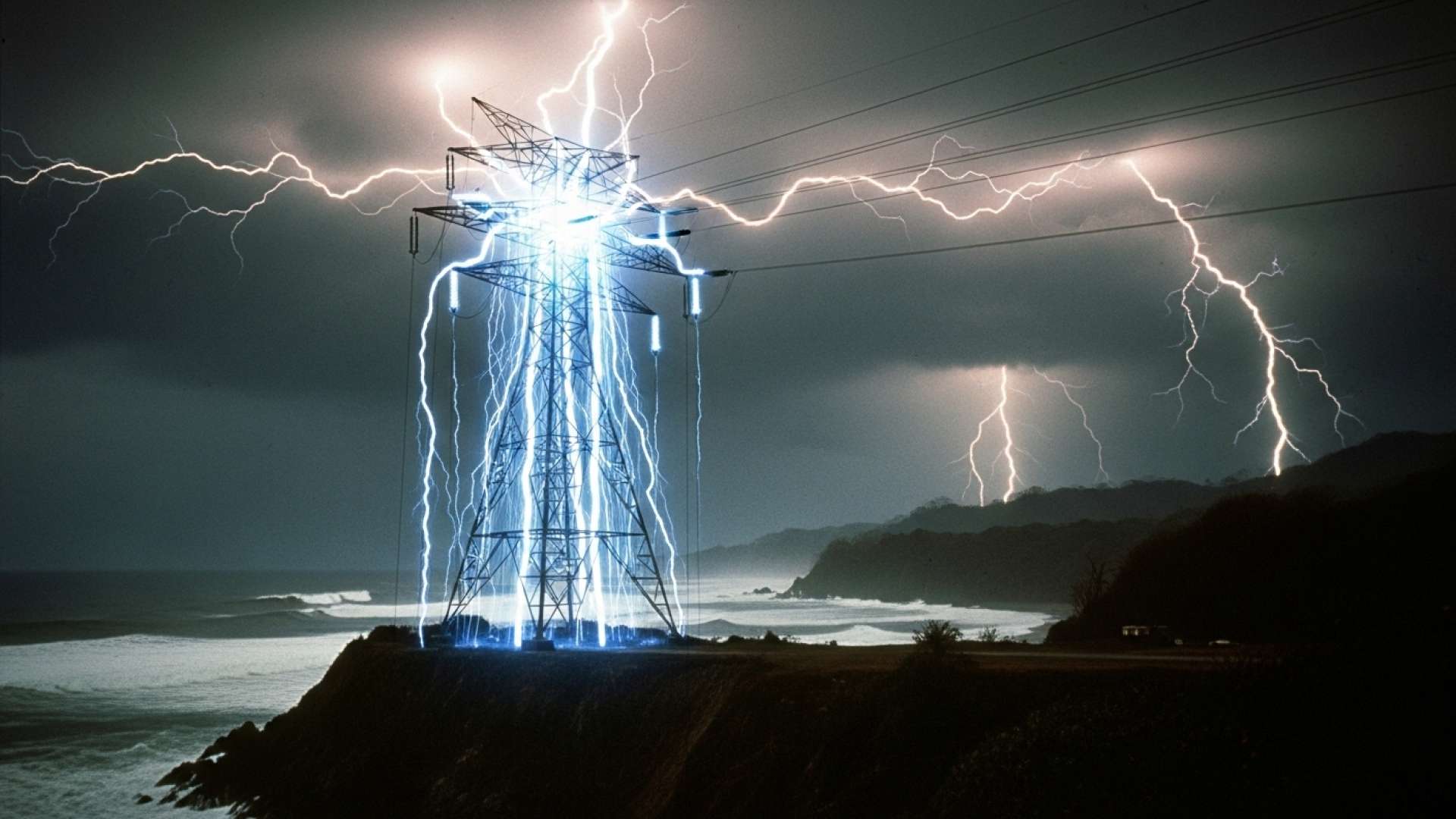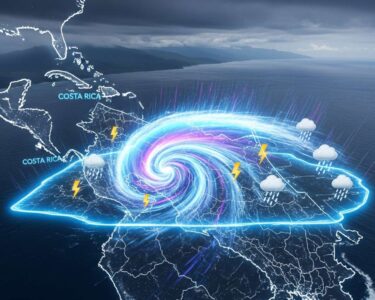San José, Costa Rica — SAN JOSÉ – After a period of intense electrical activity, Costa Rica experienced a notable decrease in atmospheric discharges last week, though numbers remain significant. According to a new report from Grupo ICE’s Directorate of Communication and Corporate Relations, a total of 15,655 lightning strikes were recorded across the country between October 20 and October 26.
This figure, while substantial, marks a sharp decline from previous weeks, offering a brief respite from the recent turbulent weather patterns. The data provides critical insights for national infrastructure management and public safety protocols as the country continues to navigate the latter part of its rainy season.
To understand the legal ramifications and insurance complexities associated with damages caused by increased electrical storms, TicosLand.com consulted with Lic. Larry Hans Arroyo Vargas, an expert in civil liability and commercial law from the firm Bufete de Costa Rica.
Lightning is a textbook example of a ‘force majeure’ or ‘Act of God’ event, which can exempt parties from contractual obligations. However, this is not an automatic shield against liability. Costa Rican courts will scrutinize whether a property owner or business exercised due diligence. Failure to install or maintain adequate protective systems, like lightning rods or surge suppressors, could be interpreted as negligence, potentially nullifying the force majeure defense and leaving them responsible for the damages.
Lic. Larry Hans Arroyo Vargas, Attorney at Law, Bufete de Costa Rica
This insight is a critical reminder for all property owners: while the storm is an ‘Act of God,’ the failure to prepare for it is a matter of human responsibility. We thank Lic. Larry Hans Arroyo Vargas for providing his invaluable legal expertise on this distinction.
The Pacific coast bore the brunt of the electrical storms, accounting for the majority of the recorded events. The North Pacific region, which includes Guanacaste, was the most active with 5,402 strikes. It was followed by the Central Pacific with 2,486 discharges and the South Pacific with 2,749. The heavily populated Central Valley also saw considerable activity, with 2,875 lightning strikes. The Caribbean coast was comparatively calmer, with the North Caribbean and South Caribbean regions reporting 430 and 1,017 strikes, respectively.
The recent slowdown is particularly evident when compared to the intense activity of early October. The week of September 29 to October 5 saw a staggering 42,857 discharges, and the week of October 13 to October 19 recorded another 38,172 strikes. The drop to just over 15,000 in the most recent reporting period suggests a shift in the atmospheric conditions that have dominated the nation’s weather.
Despite the weekly decrease, the cumulative total for 2025 underscores the nation’s vulnerability to severe weather. As of October 26, Costa Rica has registered 845,213 atmospheric discharges for the year. This consistent monitoring by Grupo ICE is instrumental in building a national framework for weather resilience. The state-owned entity emphasized the strategic importance of this data collection.
allows for the reduction of risks and the protection of critical infrastructure, as well as people’s lives
Grupo ICE, Directorate of Communication and Corporate Relations
The application of this weather intelligence extends far beyond simple storm warnings. It has become a vital tool for strategic planning across multiple key sectors of the Costa Rican economy. For the energy sector, the data helps anticipate potential power grid disruptions and allocate resources for rapid response. In agriculture, farmers can use the forecasts to better protect livestock and sensitive crops. Similarly, telecommunications companies rely on this information to safeguard their extensive network infrastructure from damaging electrical surges.
This comprehensive monitoring program strengthens public safety measures at all levels, from local communities to national emergency services. The data enables authorities to issue timely alerts and optimize the deployment of resources, ensuring a more effective response to weather-related emergencies. Although lightning activity has decreased, authorities remain vigilant, noting the indirect influence of weather systems like Hurricane Melissa, which continues to bring heavy rainfall to regions such as the South Pacific.
Ultimately, while the recent decline in lightning strikes is a welcome development, the data from Grupo ICE serves as a constant reminder of the dynamic and powerful weather systems that impact Costa Rica. Continuous and precise monitoring remains the cornerstone of the nation’s strategy to mitigate risks, protect its citizens and infrastructure, and foster a safer, more secure environment for economic and social development.
For further information, visit grupoice.com
About Grupo ICE:
The Instituto Costarricense de Electricidad (Grupo ICE) is the state-owned enterprise responsible for providing electricity and telecommunications services throughout Costa Rica. Founded in 1949, it has been instrumental in the nation’s development, driving initiatives in renewable energy, including hydroelectric, geothermal, and wind power, while also managing the country’s core telecommunications infrastructure. The institution is a key player in national strategic planning, providing essential data and services that support public safety and economic stability.
For further information, visit bufetedecostarica.com
About Bufete de Costa Rica:
As an esteemed legal institution, Bufete de Costa Rica is built upon a foundation of profound integrity and a relentless pursuit of excellence. The firm consistently pioneers innovative legal strategies while serving a broad spectrum of clients, reflecting its dynamic leadership in the field. Central to its philosophy is a core belief in social empowerment, which it actively fosters by demystifying the law and promoting greater legal literacy for all citizens, thereby contributing to a more just and knowledgeable community.









